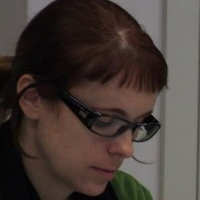
Nadja Duhacek
I am a freelance researcher and workshop facilitator, currently living and working in Belgrade, Serbia. My main area of interest is feminism and formal education, particularly feminist approaches to teaching in elementary school.
Between 2013 and 2015 I was a member of the team that conducted the first research project on Gender Based Violence (GBV) in schools in Serbia. Also, together with a group of colleagues, I have developed a workshop for elementary schools teachers, in which they learn about gender issues and feminism, entitled "All Out Identities". (See more at http://katalog2015.zuov.rs/Program2015.aspx?katbroj=72&godina=2014/2015)
Most recently, I have been part of wonderful team in a project aimed at making women scientists more visible, entitled "Nauka je ženskog roda" or Scien(ce)tists are female". (See more at https://www.facebook.com/NaukaJeZenskogRoda). My role was primarily to develope workshops in which young people learn about biographies of specific women; and through analyzing the obstacles those women faced in their careers, they can begin to understand the need for a gender perspective in their future work, scientific and otherwise.
In 2013, I completed a Master’s program in Women’s and Gender Studies, which was jointly organized by the University of Granada and the Institute for Humanities in Ljubljana. Also, I have a Bachelor of Arts degree from the American University in Bulgaria; from an interdisciplinary program called Southeast European Studies (anthropology, history, economics, political science).
I am a member of the Gender and Education Association and the Whedon Studies Association.
Supervisors: Adelina Sanchez Espinosa, University of Granada, Svetlana Slapsak, Institutum Studiorum Humanitatis, and Cosmina Tanasoiu, American University in Bulgaria
Between 2013 and 2015 I was a member of the team that conducted the first research project on Gender Based Violence (GBV) in schools in Serbia. Also, together with a group of colleagues, I have developed a workshop for elementary schools teachers, in which they learn about gender issues and feminism, entitled "All Out Identities". (See more at http://katalog2015.zuov.rs/Program2015.aspx?katbroj=72&godina=2014/2015)
Most recently, I have been part of wonderful team in a project aimed at making women scientists more visible, entitled "Nauka je ženskog roda" or Scien(ce)tists are female". (See more at https://www.facebook.com/NaukaJeZenskogRoda). My role was primarily to develope workshops in which young people learn about biographies of specific women; and through analyzing the obstacles those women faced in their careers, they can begin to understand the need for a gender perspective in their future work, scientific and otherwise.
In 2013, I completed a Master’s program in Women’s and Gender Studies, which was jointly organized by the University of Granada and the Institute for Humanities in Ljubljana. Also, I have a Bachelor of Arts degree from the American University in Bulgaria; from an interdisciplinary program called Southeast European Studies (anthropology, history, economics, political science).
I am a member of the Gender and Education Association and the Whedon Studies Association.
Supervisors: Adelina Sanchez Espinosa, University of Granada, Svetlana Slapsak, Institutum Studiorum Humanitatis, and Cosmina Tanasoiu, American University in Bulgaria
less
InterestsView All (26)
Uploads
Papers by Nadja Duhacek
In our work, we will explore five tropes of femininity in Yugoslav cinema: (1) the role of the partisan, (2) woman in the background, (3) collaborator, (4) worker and (5) housewife, in order to map out ways in which the representation of women between between 1947 and the late 1960's corresponds to official emancipatory politics of the time and how these tropes related with everyday life in this period. Finally, this will lead to an analysis of cinema as a collection of stories Yugoslav women and men told themselves (and others) about themselves. This approach has the potential to indicate the antagonisms within the social context in which these films were produced, by highlighting the unattained ideals of freedom and emancipation. Simultaneously, the goal of this analysis is not to merely open up another space for a more complex exploration of the past, but also to reconsider the emancipatory potential this exploration offers us today.
Key words: woman, gender, socialism, Yugoslavia, film, representation
Centar za studije roda, Fakulteta političkih nauka – Univerziteta u Beogradu sproveo je "Istraživanje rodno zasnovanog nasilja u školama u Srbiji". Tim povodom Centar za studije roda organizuje naučni skup na kome će rezultati ovog istraživanja biti pretpostavka za raspravu o nasilju i rodnim ulogama pre svega u školskom okruženju, kao i za razgovor o ostalim srodnim pitanjima.
Books by Nadja Duhacek
In our work, we will explore five tropes of femininity in Yugoslav cinema: (1) the role of the partisan, (2) woman in the background, (3) collaborator, (4) worker and (5) housewife, in order to map out ways in which the representation of women between between 1947 and the late 1960's corresponds to official emancipatory politics of the time and how these tropes related with everyday life in this period. Finally, this will lead to an analysis of cinema as a collection of stories Yugoslav women and men told themselves (and others) about themselves. This approach has the potential to indicate the antagonisms within the social context in which these films were produced, by highlighting the unattained ideals of freedom and emancipation. Simultaneously, the goal of this analysis is not to merely open up another space for a more complex exploration of the past, but also to reconsider the emancipatory potential this exploration offers us today.
Key words: woman, gender, socialism, Yugoslavia, film, representation
Centar za studije roda, Fakulteta političkih nauka – Univerziteta u Beogradu sproveo je "Istraživanje rodno zasnovanog nasilja u školama u Srbiji". Tim povodom Centar za studije roda organizuje naučni skup na kome će rezultati ovog istraživanja biti pretpostavka za raspravu o nasilju i rodnim ulogama pre svega u školskom okruženju, kao i za razgovor o ostalim srodnim pitanjima.